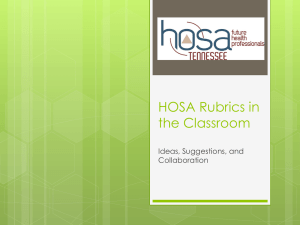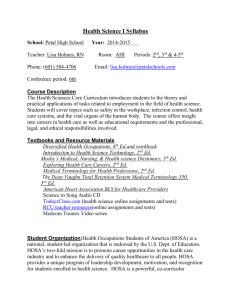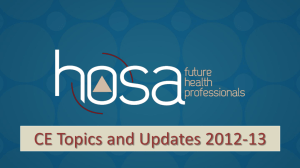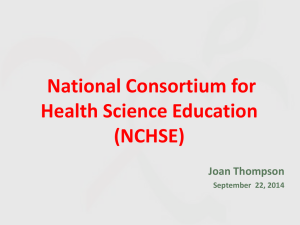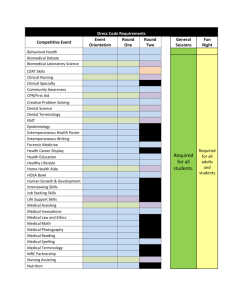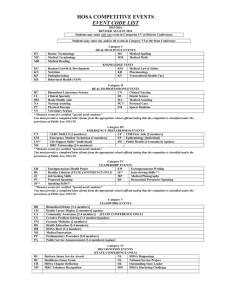Syllabus - Petal School District
advertisement
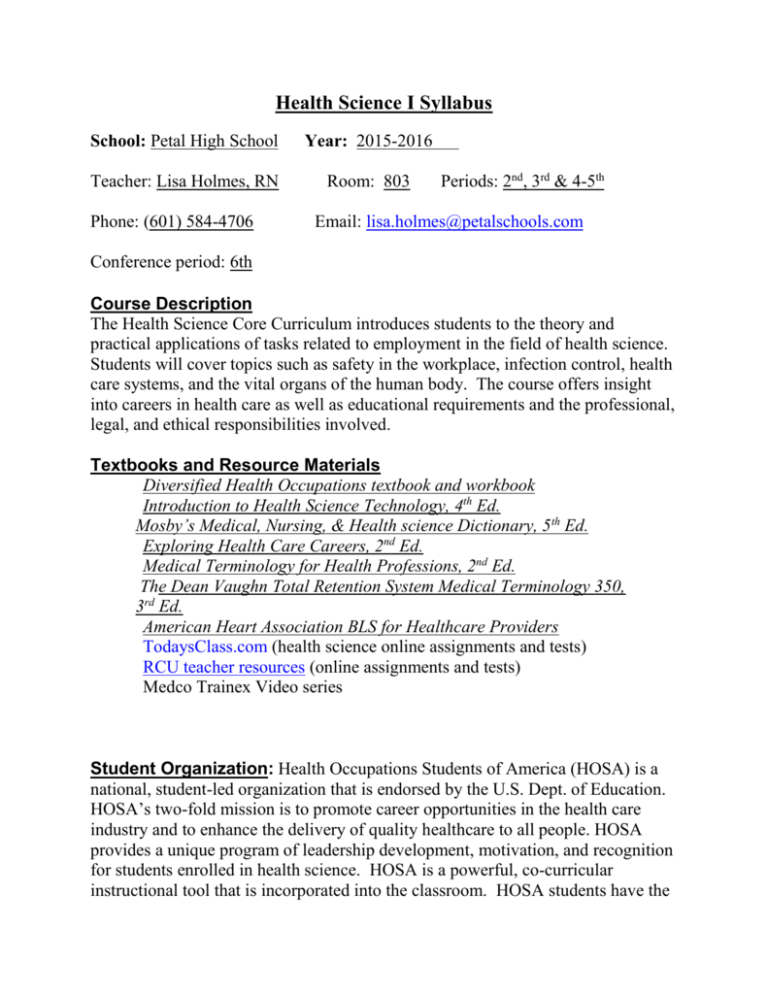
Health Science I Syllabus School: Petal High School Year: 2015-2016 Teacher: Lisa Holmes, RN Room: 803 Phone: (601) 584-4706 Periods: 2nd, 3rd & 4-5th Email: lisa.holmes@petalschools.com Conference period: 6th Course Description The Health Science Core Curriculum introduces students to the theory and practical applications of tasks related to employment in the field of health science. Students will cover topics such as safety in the workplace, infection control, health care systems, and the vital organs of the human body. The course offers insight into careers in health care as well as educational requirements and the professional, legal, and ethical responsibilities involved. Textbooks and Resource Materials Diversified Health Occupations textbook and workbook Introduction to Health Science Technology, 4th Ed. Mosby’s Medical, Nursing, & Health science Dictionary, 5th Ed. Exploring Health Care Careers, 2nd Ed. Medical Terminology for Health Professions, 2nd Ed. The Dean Vaughn Total Retention System Medical Terminology 350, 3rd Ed. American Heart Association BLS for Healthcare Providers TodaysClass.com (health science online assignments and tests) RCU teacher resources (online assignments and tests) Medco Trainex Video series Student Organization: Health Occupations Students of America (HOSA) is a national, student-led organization that is endorsed by the U.S. Dept. of Education. HOSA’s two-fold mission is to promote career opportunities in the health care industry and to enhance the delivery of quality healthcare to all people. HOSA provides a unique program of leadership development, motivation, and recognition for students enrolled in health science. HOSA is a powerful, co-curricular instructional tool that is incorporated into the classroom. HOSA students have the opportunity to compete against other HOSA students at district and state competitions. Participation in HOSA provides a valuable experience and is a great college resume/extracurricular builder. Membership dues of $15.00 are required. PHS HOSA will compete at a District Leadership & Competitive Events Conference and winners will compete at the State HOSA competition. Students will be responsible for conference registration fees and rooming costs. For more information go to HOSA’s website www.hosa.org. Course Expectations: Students will: Explore health care careers as a bridge to develop personal career goals Acquire attitudes, values and behavioral qualities becoming to a health care professional Engage in health care activities which promote opportunity for problem solving and critical thinking in a real world situation Develop knowledge in a rapidly changing technical health care career field Master patient care competencies in a practical lab setting Distinguish between normal and abnormal body structures and functions Earn certifications in Health Care Provider CPR, First Aid and OSHA’s Bloodborne Pathogen Standards Certificates/Awards: Certificate of Completion or 100% Achievement awarded to those students completing the Dean Vaughn Medical Terminology Course with at least 80% on the Final Exam Certificate of Completion if completed Todaysclass.com Online Instruction Course with at least an 75% or higher average Student Services Student services are available to help CTE students succeed in their academic classes. Students in health science are eligible for extra assistance by asking for help or by teacher referral to the Student Services teachers. These teachers specifically help with core classes. A CTE counselor is also available to help health science students with class scheduling, career pathways and college preparations. Course Outline 1st 9 weeks Health Science I Core (Course Code: 995100) Unit 1: Course Orientation and Professional Organizations Unit 4: Communication and Teamwork Unit 3: Health Care Systems, Legal, and Ethical Practices 2nd 9 weeks Health Science I Core Unit 2: Safety and Infection Control Unit 5: Body Organization, Covering, Support, and Movement 3rd 9 weeks Health Science I Core Unit 6: Vital Organs and Protection Unit 7: Intake and Elimination 4th 9 weeks Health Science I Core Unit 8: Control, Regulation, and Coordination Unit 9: Reproduction and Health Maintenance Practices Teaching Strategies & Activities . 1. Students will listen to PPT lecture and participate in discussion, role play, games, projects, and small group activities concerning learning objectives. 2. In groups, students will compare different medical resources and analyze information. Students will create class presentations using Screen Casts, Podcasts, Photo Story, Movie Maker, Picasa software, etc. 3. Students will listen to lecture, participate in class discussion, view teacher demonstration of medical skills, practice and perform skills. 4. Students will watch the Dean Vaughn Learning System videos on Medical Terminology and use the Dean Vaughn Learning Guide to complete written assignments. Students will play picture games, computer games and board games to reinforce learning. 5. Students will read and explore interactive diagrams and play games on Todaysclass.com online instruction website. 6. Students will participate in rotation learning labs to practice and learn medical skills. 7. Students will view YouTube audiovisuals, medical movie excerpts, Medco Trainex medical videos and other medical audiovisual resources. 8. Review articles and respond to blogs, wikis, discussion boards and participate in various activities. Assessment Strategies Unit test with required mastery of competencies Performance-based lab practicals, rubric (group & individual grading) Multiple choice and completion quizzes and Unit tests. (online and paper tests) Oral identification and name testing of anatomical components and medical equipment Rubric grading for presentations and projects (Assessments are flexible to support the needs of academic content standards) Monitor class activity to ensure that all students participate. Assess students’ knowledge through online assessments and bell ringer quizzes. Grading Policy All students will be graded according to an accumulation of points received on all assignments. Grading will be based on a large variety of assignments including worksheets, projects, quizzes, lab practicals, presentations, Todaysclass.com assignments, blackboard.com assignments, and other activities. I do not give grades. Students earn them. Daily grade calculation: Class Work- Quizzes, Projects, Worksheets, Assignments 30% Class Participation (presence, attitude, attentiveness & participation) 10% Unit Tests and Performance-based Practical Lab Grades 60% Term grade calculation: Daily grade 75% 9-weeks exam 25% Classroom Expectations: Students will: 1. Actively participate in and complete class activities and assignments. If absent, it is the student’s responsibility to obtain make up work. If work isn’t made up in the time allowed per school policy, the student will receive a “0” for work missed. 2. Demonstrate a mature, professional attitude and perform within the realm of safe student practice. 3. Abide by the classroom and lab rules as listed below. We have a lot of group work and each student is expected to respect and work well with other students at all times. This will be reflected in the classroom participation grade. Supplies/Fees 1 inch binder with 2 section dividers (1 divider for Health Science and 1 for HOSA) Navy blue scrubs- any style Clean, closed-toed shoes in PHS dress code colors Facial tissue (Kleenex) Hand sanitizer Colored markers (student may keep in his/her backpack) 400 note/index cards (lined or unlined) $15.00 lab fee $20.00 HOSA dues (optional) Academic Honesty and Integrity Policy Health science students assume full responsibility for the content and integrity of all work submitted. Cheating on an educational exercise not only reflects dishonesty but greatly diminishes the student’s character. Do not give work to others to copy Do not represent work of others as your own Do not use or obtain unauthorized assistance on work including online assignments Discipline for students being dishonest in health science will follow PHS handbook guidelines Classroom rules: 1. Come to class prepared with required materials. 2. Respect yourself and others. 3. Respect classroom property and the property of others (Hands off!) 4. Follow safety guidelines at ALL times when in the classroom. 5. Store cell phones and other electronic devices appropriately. If a student has his/her cell phone out during class without teacher permission, it can result in an office referral.(this is school policy) Lab rules: 1. Do NOT touch any equipment in the classroom/lab unless directed by the instructor. 2. Do NOT sit in wheelchairs and at NO time should a student lie down on a bed or stretcher. 3. No horseplay or practical joking in the classroom or lab. 4. If a student’s irresponsible behavior causes damage to equipment, he/she will be responsible for repairing or replacing equipment. 5. Students will receive 1 warning regarding behavior during lab. If behavior doesn’t improve, he/she will not participate in the lab for that class period and may receive a “0” for that day’s lab. Consequences: 1st offense- verbal warning 2nd offense-conference with student and if behavior occurs during a lab, it may result in a 0 for the lab 3rd offense-conference with parent, documented. 4rd offense- discipline referral to administration. Students must pass Health Science I with a C or better in order to take Health Science II next year. Health Science I Parent Signature Form I have read all 6 pages of this syllabus and I am aware of the rules and requirements of this health science class. Print student’s name: ______________________________ Student signature: _________________________ Date: __________ Parent signature: __________________________ Date: __________ Parent signature: __________________________ Date: __________ Parent email address: _________________________________________ Parent phone number(s): ______________________________________
